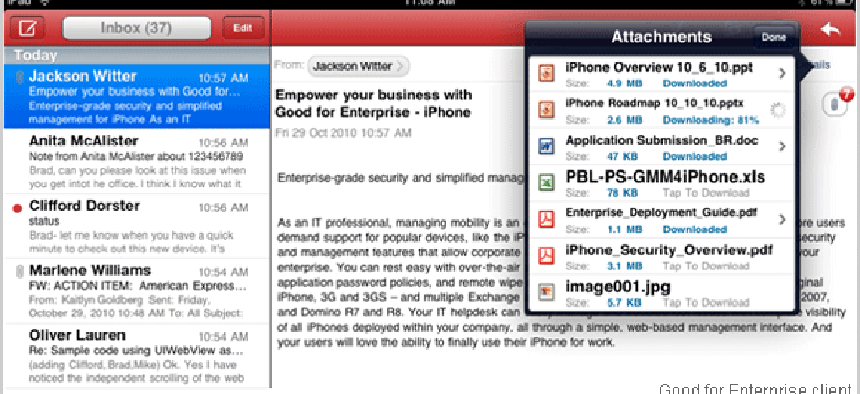Connecting state and local government leaders
The commonwealth's IT agency sets up an any-device framework using Good for Enterprise and is luring users into the program.
The “bring your own device” (BYOD) philosophy is something that every public-sector agency IT department will have to deal with, if they haven’t already. Simply put, users want to use their own mobile devices for work-related communications and file sharing, and any network administrator who doesn’t have a plan in place may end up with a dissatisfied work force or, in the event of a breach resulting from unmanaged devices, something a lot worse.
Admins need to look at the issue as early as possible and find a solution that works.
The Virginia Information Technologies Agency, for example, has established a platform for bringing state employees’ personal devices into the enterprise and hopes to have nearly all employees using their own devices within a few years.
VITA is responsible for the technological needs of all employees of the Commonwealth of Virginia, which includes more than 60,000 e-mail clients. Back in early 2011, all of the mobile users had state-owned smart phones managed by centralized server software, in this case BlackBerry phones managed by BlackBerry Enterprise Server (BES). But many of the employees had mobile devices for personal use, so it was only a matter of time before they would want to use those devices for work.
“There was a lot of interest in exploring how we can deal with the fact that state employees are issued a BlackBerry, but they typically also own another smart phone that, for them as individuals, is a preferred device to their BlackBerry,” said Sam Nixon, VITA’s CIO.
At this point the IT team began to look around for the solution that would serve their needs the best. At the barest minimum, it needed to serve basic communications such as e-mail and messaging, as well as file sharing, in a secure and regulated environment. Working with Northrop Grumman, which is contracted to provision all IT services in the commonwealth, officials decided to implement Good for Enterprise.
Made by Good Technology, Good for Enterprise is a service that provides secure e-mail, contacts, messaging, calendar, browser and document storage in an encrypted cloud-based environment. The client apps can run on nearly any mobile device, and they allow access to the service with password authentication. It interfaces with such networking utilities as Microsoft Active Directory and Exchange Server. No customization was necessary to get Virginia set up, and a new user can be up and ready to go within 48 hours.
Two key features of Good for Enterprise are remote security controls and a separation of work and personal data and apps.
The app sets up an encrypted virtual “container” on the device in which all work-related activity is placed. If the device is reported stolen or the app detects any hacking attempts, the container can be wiped without affecting the personal data outside the container. Another plus is that the browser within the container allows the user to securely connect to browser-based applications.
Those features appealed to VITA, even if the state didn’t require them for base functionality. Another feature Good provides that VITA hasn’t explored yet is the possibility of a state-sponsored app store, such as those the Army and Defense Information Systems Agency are developing.
One of the biggest challenges in implementing a BYOD policy is not the technical hurdles, but getting users to accept the new way of doing things. Even though logic would say users would be better off once they switch over to Good for Enterprise start using their own phones for work, many either don’t want to change how things are, or are worried about their personal data and work data being on the same device. Because the service for Virginia state employees is entirely voluntary, adoption is currently at about 5 percent of all employees with mobile devices.
But VITA has a plan to kick this into high gear — financial incentive. Officials are currently in the final stages of signing off on a wireless guidance document that will establish a policy where agencies give each employee a stipend for using their own device with the Good for Enterprise service.
“Now that we have a BYOD service and mechanism for smart-phone use, the state will actually save money,” Nixon said. “Instead of buying the BlackBerry, paying for the service, the BES connection and the data plan, employees will do all of that themselves. In return we will provide a modest stipend that will be a fraction of what we spend now for a state-owned device.”
Though there are too many variables to make an accurate prediction, VITA officials hope that adoption will climb to 25 to 50 percent within a year of the stipend policy taking effect, and ideally will get close to 100 percent about a year or two after that.
Once user adoption increases, Nixon thinks everyone will see the benefits of this solution. “I think the employees will be better off because they’ll only have to carry one phone, and the phone they carry will be exactly the one that they want to carry,” he said. “We will be better off because not only will we save some money, but we will have comfort in that the e-mail will be delivered as securely as to a state-owned device.”
The ultimate goal in all of this is to free employees and agencies from concerns about their technology, and allow that technology to help them do their jobs. “Do you want agencies to be in the technology business, or do you want them to meet their statutory responsibilities in serving the public?” Nixon said. “Of course, the latter is the correct answer. This would be another way in which the technology is being used to enable the agencies to more clearly focus on their core missions of government.



